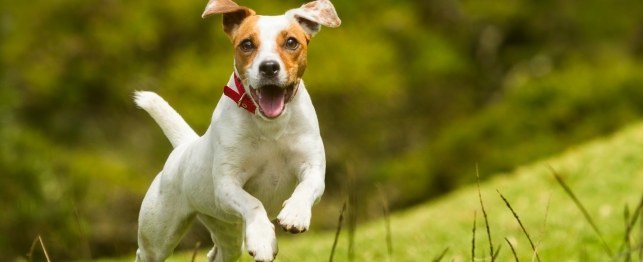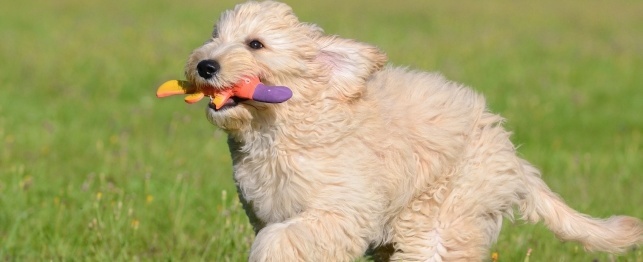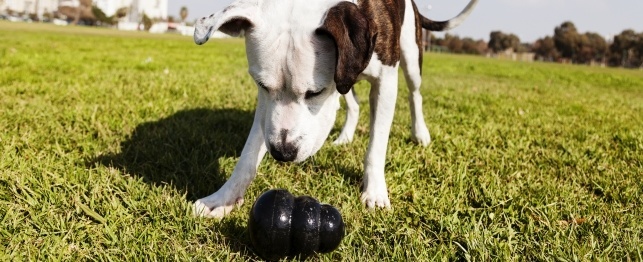Aggressive behavior in dogs can be a result of a number of factors. Oftentimes, the trigger is something from the dog's past that was never extinguished. Other times the problem can be an issue of dominance between owner and dog. The thing about aggression in dogs is that it has to be addressed immediately. Dogs who are allowed to behave aggressively over a long period of time might very well become unsafe.
Where the Tendency toward Aggression Comes From
Aggressive behavioral tendencies can be seen when the dog is only 6 weeks of age. Puppies of this age have reached a critical development phase, one which requires socialization and training to stave off inappropriate behaviors such as biting human beings. This training stage needs to go on a minimum of 8 weeks, but can continue on. The bottom line is that in order to avoid future aggressive behavior in your dog, be certain that your puppy is correctly socialized with both other dogs and people at least by the time he is 14 weeks old.
Extrapolating this information, this points to a number of things. One, a puppy should never be exited from its litter prior to the age of 8 weeks. The second thing to keep in mind is that rough discipline ought to be eschewed during weeks 8 and 10 of life. This period should be marked by gentle treatment. When you strike, yell, or use other extreme consequences in puppies, you are encouraging and creating aggressive behavior in your dog.
Aggressive behavior in dogs can be triggered by many different things. It's clear that a dog's genetics and heredity are important factors. We are aware that specific breeds tend to be more aggressive than other breeds. However, exceptions factor into to this as well. Aggressive behavior tends to occur alongside neutering and spaying.
Environment is viewed as the single biggest factor creating aggressive behavior in dogs. Overly stern masters, limited socialization, and poor living conditions all contribute to aggression. If a dog undergoes trauma at the hands of another dog, his risk for developing aggressive behavior increases considerably.
Frequently, aggression is a product of the group dynamics that exist inside a pack of dogs. Aggressive behaviors can be committed to create a pecking order. Posturing as well as biting are often behaviors dogs utilize to establish dominance. If you want to get the upper hand on a dog's behavior before it's too late, then establish dominance early and be consistent.
Stopping Aggressive Behavior After It Develops
When your dog is 14 months old, it has gained sexual maturity. If after this time, your dog is showing aggressive behaviors, you must take matters into your hands immediately. Two essential factors are not rewarding for aggressive behavior in your dog and making sure that you are seen as the pack leader by your dog.
Your dog should be trained to obey your commands. You also need to be in control of the times when your dog is fed and walked. If you allow the dog to become a leader in your home, then your dog will end up being more aggressive. Your dog must not take on the role of the leader of your pack.
Oftentimes, dogs exhibit aggression as a way of defending themselves. This means that fear provokes their aggression. Often this is a function of incorrect socialization. Small children are oftentimes seen as a threat by dogs. Thus, restrict your pet's exposure to young children. You can also get the help of a trainer, behaviorist, or training sessions that can help get your dog used to your dog to social situations.
When your dog behaves aggressively, you are faced with a difficult problem. You can be held liable for damage your dog inflicts. Don't worry, this behavior can be controlled and eradicated, even in more mature dogs. If your dog ever expresses violent behaviors, then you have to get professional help immediately. If someone is hurt by your dog, your dog could suffer tough consequences.

 How to Balance Your Pets Play and Relaxation
How to Balance Your Pets Play and Relaxation
How to Balance Your Pets Play and Relaxation
How to Balance Your Pets Play and Relaxation
 Five Games That Will Delight Your Dog
Five Games That Will Delight Your Dog
Five Games That Will Delight Your Dog
Five Games That Will Delight Your Dog
 Teaching Your Dog Polite Leash Skills - Canine Manners 101 Dog Training Series
Teaching Your Dog Polite Leash Skills
This article i
Teaching Your Dog Polite Leash Skills - Canine Manners 101 Dog Training Series
Teaching Your Dog Polite Leash Skills
This article i
 Commercial Brain Games Challenge Your Dog
Commercial Brain Games Challenge Your Dog
Commercial Brain Games Challenge Your Dog
Commercial Brain Games Challenge Your Dog
 Doggie Day Care
Doggie Day Care
Doggie Day Care
Doggie Day Care